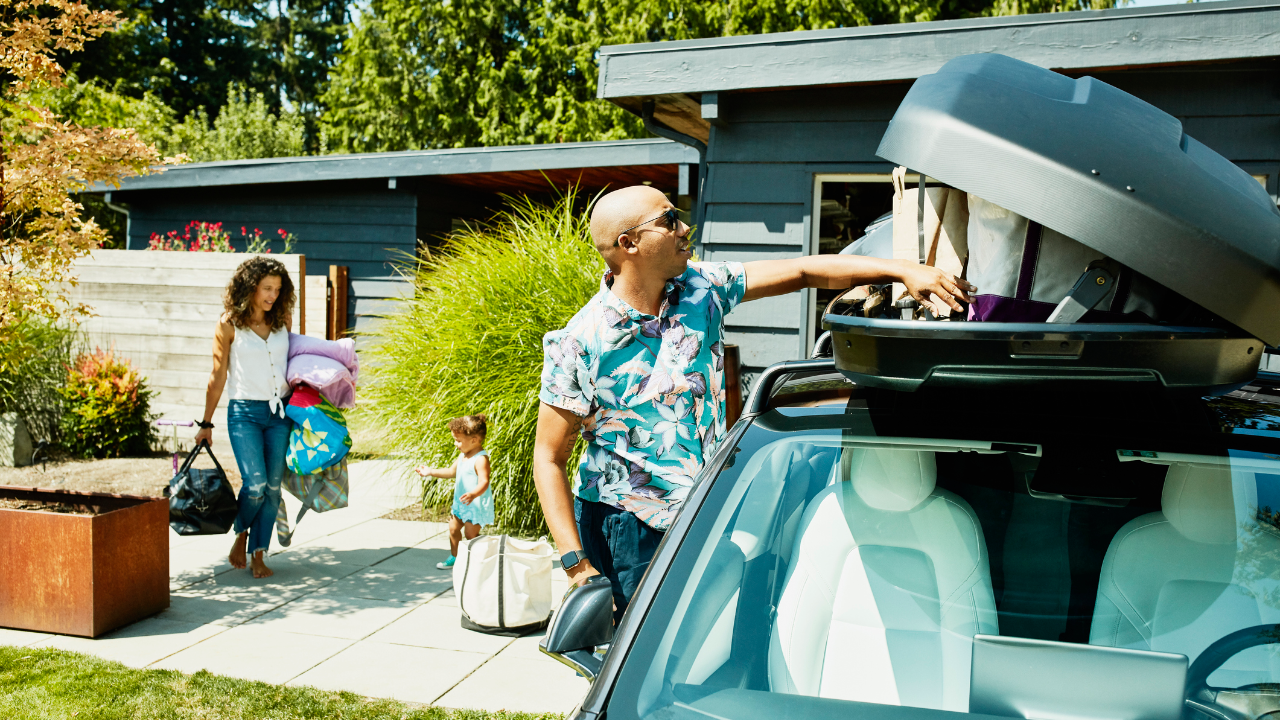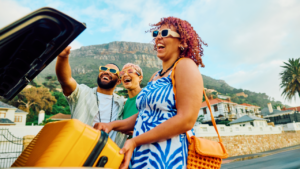Summer travel trends and safety during COVID

After several weeks hunkered down at home, a quick grocery store run is slightly exciting nowadays. As states phase in relaxed COVID-19 restrictions and the country slowly reopens, it’s hard to ignore the urge to get away – somewhere beyond the confines of your neighborhood.
From national parks and theme parks to hotels, restaurants and casinos – the hospitality industry is taking serious steps to mitigate risk to their employees and guests. Disney World just announced their reopening July 11 with a litany of restrictions, like limiting the number of visitors, timed entry reservations, mandatory face masks, contactless payments, and temperature testing both guests and employees.
Even with restrictions and safety measures in place, you may wonder if traveling is worth the risk. While health officials from the Centers for Disease Control (CDC) and the US Department of State’s Global Health Advisory advise against travel altogether, states that are opened for business, just in time for summer, are hoping people will choose to take advantage of deep discounts and cheap gas.
The latest statistics from GasBuddy suggest that some 31 percent of Americans are planning at least one road trip this summer. With gas below two dollars a gallon, it’s certainly tempting to take at least a day trip in the comfort and safety of your vehicle. And while there’s risk traveling during a pandemic, the rewards are enough to make many Americans venture out. So, if you plan on traveling this summer, here’s what to expect.
The travel and hospitality industry is going above and beyond to ensure your safety
“The whole industry is pivoting to a different way of operating,” says Dr. Donna Quadri-Felitti, Marvin Ashner Director and Associate Professor at The Pennsylvania State University School of Hospitality Management. “The hotel and restaurant industry is adapting their real estate for the needs of this crisis, to keep people safe.”
In early May, the American Hotel Lodging Association (AHLA) issued enhanced cleaning and safety guidelines. The “Stay Safe” initiative is focused on enhanced hotel cleaning practices and will seek to change hotel industry norms, behaviors and standards to ensure both hotel guests and employees are confident in the cleanliness of hotels as travel resumes.
Dr. Quadri-Felitti says technology has played a huge role in helping the industry continue to operate under a ‘new normal.’ Contactless check-in/check-out, keyless room entry, touchless elevators, virtual TV remotes and social distancing apps are being deployed by hotels across the world to keep visitors safe and comfortable.
Bigger hotel brands are rolling out their own heightened safety protocols. Starting in June, Hilton Worldwide will launch its “CleanStay” program – implementing contactless technologies in addition to rigorous cleaning practices advised by medical experts from the Mayo Clinic COVID-19 Response Team. Marriott International’s “Cleanliness Council” is testing ultraviolet light technology to sanitize guest keys and adding electrostatic sprayers to sanitize surfaces throughout the hotel.
“Cleanliness and security has always been part of the hospitality industry. We are well-versed at being highly regulated, very well-trained and monitored – COVID-19 is just taking it to the next level. It’s business imperative that we don’t just meet CDC standards, but exceed them,” says Quadri-Felitti.
Rental properties
Like traditional hotels, person-to-person home rental companies like AirBnB and Vrbo have updated their guidelines around cleaning. AirBnB updated their cleaning requirements for hosts to include new procedures such as wearing a mask and gloves when cleaning, wiping services with disinfectants made of bleach or 70% isopropyl alcohol in addition to traditional soaps, washing all linens in hot water, emptying vacuum after each use and more.
Vrbo also adapted their cleaning practices to the new reality of COVID-19. Their guidelines include focusing on high traffic areas of the rental when cleaning, and letting the property remain empty for at least 24-hours after a renter leaves.
Air travel takes a back seat to road trips
Whether you’re planning an in-state day trip or a week-long getaway to a mountain rental, road travel provides flexibility and offers a safer, more isolated environment that airlines can’t compete with. And how you get there is just as important as your destination. Road warriors are looking for more inclusive travel and are turning to recreational vehicles and the great outdoors to distance themselves from others and commune with nature.
Self-contained travel
If spending the night in a hotel or property rental is not your preference – recreational vehicles that offer self-contained travel are increasingly popular. RVshare, a rental marketplace similar to Airbnb, just announced they hit record numbers with a 650% rise in RV rental bookings since early April 2020.
Self-contained RVs provide transportation, accommodation, and a place to cook all in one – allowing travelers to better control their social distance. RV parks and private campground owners are preparing safety processes similar to hotels with specific plans for cleaning, disinfecting and maintaining distancing.
Wellness and wide-open spaces
Naturally in a pandemic, people look for destinations that offer plenty of room to roam and less interaction with others. With many national parks set to reopen, parks staff, small business staff and owners are preparing for the surge of visitors itching to get outdoors.
Kara Maceross, program manager and guide for Lasting Adventures, a travel service that offers everything from day hikes, backpacking trips and summer camps in Yosemite National Park, started working last week and says business is already picking up. “We’re seeing way more bookings than we thought we would. People want to get out, and parents want their kids to enjoy the summer after months of being cooped up.”
Yosemite hasn’t officially opened (at the time of publication), but when it does, there will be fewer visitors and more restrictions. Visitor capacity will be reduced by about 50 percent to promote social distancing, and day visitors will be required to register for a pass to reserve entrance ahead of time through recreation.gov. Yosemite is one of the country’s most visited national parks, hosting more than 4.5 million travelers in 2019.
Maceross says that besides limiting travel groups to 10 members, they’re also temperature screening employees and camp visitors while implementing strict cleaning procedures for equipment coming back from excursions.
“Sanitizing gear, washing hands more frequently, wearing masks when welcoming guests, and coming up with team-building activities that require no contact is all part of the new norm.”
Advanced planning is required
However you travel, it’s imperative to plan ahead. That means getting more information directly from the hotel or rental property and double-checking your destination’s rules before hitting the road. State, county and even town safety restrictions can change in an instant if COVID hot spots flare up, so frequent checks until the day you leave will help you make an informed decision on whether travel is safe or not.
Be prepared for check-ins and quarantines
If you’re traveling from hot spots like New York, New Jersey, New Orleans and Connecticut, you may be required to quarantine for 14 days. Some states are installing checkpoints and requiring identification and address where visitors will be in quarantine. Health care officials may also pay a visit at the address given for a health check. It’s a good idea to avoid states with quarantine restrictions if you want to explore the sights and sounds. The CDC has a website where you can check the current rules by state.
Cancellation policies
Fortunately, cancellation policies are currently more generous than before. However, refunds and credits are up to the hotel, tour operator or travel business. Hotels typically allow cancellations up to 24 hours in advance, but rentals aren’t as lenient. Before booking travel, understand the cancellation policies in relation to state and local laws. Incentives to re-book rather than cancel are being offered by travel companies, airlines and cruise lines.
How your credit card can help you save on your road trip
As you make your travel plans, consider how you can strategically use your credit card to maximize your budget on the road. Credit cards that offer rewards on gas purchases can put cash back in your pocket on purchases you were already planning to make.
Top rewards cards for gas purchases
Citi Rewards+® Card
The Citi Rewards+® Card is a great card for a road trip because it offers a competitive 2X ThankYou® Points on gas station and supermarket purchases (up to $6,000 a year, the 1X points). This credit card also comes with no annual fee, so it’s a good card for individuals on a budget.
Blue Cash Preferred® Card from American Express
The Blue Cash Preferred Card from American Express is a great option for families and solo road-trippers alike with its flat-rate 3 percent cash back at U.S. gas stations and 6 percent back at U.S. supermarkets (up to $6,000 per year, then 1%). If you are thinking about taking a road trip with your family this summer, the Blue Cash Preferred Card will help you save money on food and gas.
Top rewards cards for hotels
Hotel credit cards can help you make the most of your travel experience, especially if you tend to stay at the same brand of hotels wherever you travel. Additionally, there are some general travel cards that are also excellent for frequent travelers because of their broad range of travel rewards.
Citi Premier® Card
Currently, cardmembers earn 3X points on travel (which includes gas station spending, restaurants, supermarkets, air travel, and hotels) and 1X points on everything else. Enjoy $100 off a single hotel stay of $500 or more, excluding taxes and fees, through thankyou.com, once per calendar year.
Chase Sapphire Reserve®
With the Chase Sapphire Reserve®, earn 3X points on dining and a broad range of travel and travel-related expenses (after earning your $300 travel credit). Because of its broad travel rewards range, which includes over 15+ travel categories, the card ensures that you’ll get rewarded no matter where you stay. Chase recently announced limited-time perks that will include rewards on grocery store purchases, dining and home improvement purchases. You can learn more about the limited-time benefits, here.
Pack your patience and learn to adjust
We would be remiss not to mention that safe travel isn’t just the responsibility of hotels, restaurants and popular destinations. Heeding state and local laws is imperative in keeping yourself and others safe. We’ll all need to modify our behavior and make adjustments so travel is possible this summer and for the rest of 2020.
Editorial disclosure: All reviews are prepared by Bankrate.com staff. Opinions expressed therein are solely those of the reviewer and have not been reviewed or approved by any advertiser. The information, including card rates and fees, presented in the review is accurate as of the date of the review. Check the data at the top of this page and the bank’s website for the most current information.



